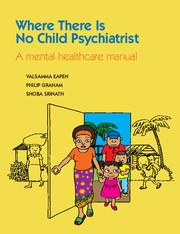Book contents
- Frontmatter
- Contents
- Preface
- Acknowledgements
- Abbreviations
- List of tables and boxes
- 1 Introduction
- 2 Assessment and treatment: general principles
- 3 Making a summary and action plan
- 4 Development and developmental problems
- 5 Intellectual disability
- 6 Habit disorders
- 7 Emotional problems
- 8 Behaviour and related problems
- 9 Specific problems in adolescence
- 10 Alcohol and drug dependency
- 11 Psychotic disorders
- 12 Chronic physical illness and disability
- 13 Physical illness without an identifiable physical explanation
- 14 Stressful situations
- 15 Parents and the needs of children
- 16 Mental health promotion
- 17 Medication
- References and suggested reading
- Appendix 1 My star chart
- Appendix 2 Guide to medication for use in childhood mental disorders
- Index
10 - Alcohol and drug dependency
Published online by Cambridge University Press: 29 April 2024
- Frontmatter
- Contents
- Preface
- Acknowledgements
- Abbreviations
- List of tables and boxes
- 1 Introduction
- 2 Assessment and treatment: general principles
- 3 Making a summary and action plan
- 4 Development and developmental problems
- 5 Intellectual disability
- 6 Habit disorders
- 7 Emotional problems
- 8 Behaviour and related problems
- 9 Specific problems in adolescence
- 10 Alcohol and drug dependency
- 11 Psychotic disorders
- 12 Chronic physical illness and disability
- 13 Physical illness without an identifiable physical explanation
- 14 Stressful situations
- 15 Parents and the needs of children
- 16 Mental health promotion
- 17 Medication
- References and suggested reading
- Appendix 1 My star chart
- Appendix 2 Guide to medication for use in childhood mental disorders
- Index
Summary
Alcohol problems
Case 10.1
Adut is a 17-year-old boy brought to the city clinic by his father at 10:00 h. His father had to support him as they walked in as Adut was staggering and hardly able to hold himself upright. Adut's father said that Adut had not got up to go to work that morning as usual. When his father went to his room to wake him, he realised he was drunk. He knew that Adut had come in very late the night before, well after his parents had gone to bed. Beside Adut's bed there were a number of cans of beer and an empty bottle of his mother's antidepressant tablets. It was clear that Adut had drunk a great deal of beer and swallowed some tablets. Fortunately, there had only been about ten tablets in the bottle. Adut worked in a bar. He was not really old enough to do this but he looked much older than his age. For the past few months Adut had often come home drunk. When he first started working at the bar a year ago everything was fine, but he began to see a girl older than himself who often came to the bar with men she had picked up. Adut had persuaded himself that she was in love with him and when she told him she did not want to go out with him, he became depressed and started to drink more heavily. While his father was telling this story Adut sat in a corner of the room, alternately vomiting and sobbing. What should the health professional do?
Information about alcohol problems
The sale of alcohol is legal in most countries, but the age at which the sale of alcohol becomes legal depends on the culture and the country. In countries in which the sale of alcohol to adults is legal, it is often easy for young people below the legal age to obtain alcohol. In many Muslim countries, however, drinking alcohol is not permitted for any section of the population.
Recommended limits of alcohol for young adults are 21 units a week for men and 14 units a week for women. A unit is one of the following:
• half a pint of beer – about 300 ml
• one small glass of wine – about 125 ml
• a small measure of spirits – about 30 ml.
- Type
- Chapter
- Information
- Where There Is No Child PsychiatristA Mental Healthcare Manual, pp. 99 - 106Publisher: Royal College of PsychiatristsPrint publication year: 2012
- Creative Commons
- This content is Open Access and distributed under the terms of the Creative Commons Attribution licence CC-BY-NC-ND 4.0 https://creativecommons.org/cclicenses/



